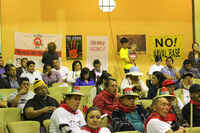Provisional verdict fifth session of the International Tribunal on Evictions - People’s social forum resistance Habitat III - Quito, 17 october 2016
Presentation of the seven cases at the 5th Session of the International Tribunal on Evictions (ITE), held in the city of Quito, representing situations affecting communities and individuals from all five continents. The selection have been made within the 88 cases received, from 35 countries as a response to the Call for Cases sent for the 5th Session, related to the eviction of 980.000 people.
The cases are as follows:
- Africa: Democratic Republic of Congo – Accaparrement des terres a Bilangalonzo - COPACO-PRP
- Europe: France - familles roumaines - Le bidonville de la Petite Ceinture, Paris - CNDH Romeurope
- South America – Brazil – despejos das ocupações em Izidora, Belo Horizonte - Coletivo Margarida Alves de Assessoria Popular
- Asia: South Korea – Militarisation of Jeju Island - Gangjeong Village Committee against Jeju Naval Base
- Middle East: Israel/The Occupied Territories of Palestine, Negev - Unrecognized Bedouin villages in Beer Chiva - RCUV
- South-America: Ecuador, Desalojos de la Comunidad de la Isla de Muisne por un supuesto riesgo tsunami
- North America: USA, Detroit. The massive eviction of the impoverished by the crisis who fail to pay the water bill due to the privatization of the sector
In addition, the ITE visited on October 15, 2016 the communities of Guayaquil still threatened by evictions:
We can conclude that all the cases presented are characterized by forced evictions forbidden by international human rights law. These evictions have had a very damaging effect on children, women, migrants, adults and other groups and minorities.
The evictions, far from representing isolated cases, are the fruit of a development model imposed on cities that prioritizes the real estate business over people’s rights, and of authorities that have proved to be a party to the situation.
As United Nations independent human rights Rapporteurs also did at the right moment, we therefore wish to draw attention to the fact that many of these serious violations of human rights are a product of a development model that HABITAT III‘s “NEW URBAN AGENDA” seeks to establish. Before doing so, the ITE’s verdict recommends avoiding referring to an urban agenda, but instead to the development of a dignified habitat that respects people’s rights in both the countryside and the city; whereupon we make the recommendations laid out below:
- Implement a global moratorium on evictions.
- Ensure the respect of human rights obligations that states have committed to: the protection and promotion of the right to housing, land and habitat for individuals and communities. These obligations are not limited to public stakeholders alone but also apply to the rest of the stakeholders in the city (property developers, market actors, among others).
- Give democracy a bigger role in decision-making concerning the management and planning of habitat which needs to recognize the social and ecological function of territories.
- Urge states and the UN as a matter of urgency to ensure adequate protection of people defending human rights involved in evictions processes and who have been subject to executions, prosecution, imprisonment and intimidation through civil actions.
Over the next few days, the ITE will publish its final recommendations so that they can be recognized and implemented by states and serve as a tool in social struggles right across the planet.
The ITE will monitor the effective implementation of the recommendations by requesting six-monthly reports and other on-going monitoring mechanisms to be determined for each concrete case.
The Jury of 5th Session International Tribunal on Evictions
ARGENTINA: Agustin Territoriale: Lawyer; He teaches subjects, Government and Society and Human Rights, Housing and founder with Sebastian Tedeschi and Javier Fernández Castro of the Observatory for Popular Habitat.
ITALY: Cesare Ottolini: Degree in Political Science, currently, world coordinator of the International Alliance of Inhabitants, and active member of the International Council of the World Social Forum, founder of the Zero Evictions Campaign at global level. He was Coordinator of Habitat International Coalition and the National Secretary of Unione Inquilini (Tenants Union). Was member of the Advisory Group of Forced Evictions of UN-Habitat .
MEXICO/USA: Miguel Robles: Urbanist, Assistant Professor of Urbanism at Parsons, Senior fellow at “Civic City”. Co-founder of the Stichting Cohabitation Stratégies (CohStra) (Rotterdam and NYC), Codirected (2012-15) with the Marxist Geographer David Harvey, the National Strategy Center for the Right to the Territory (CENEDET) in the Republic of Ecuador.
ZIMBABWE: Blessing Nyamaropa: Regional Manager at Zimbabwe lawyers for Human Rights and Councilor at the Law Society of Zimbabwe. Lawyer, involved specifically in public interest litigation to protect the right to housing, education, health, human rights training and advocacy on the promotion and protection of human rights. Community human rights awareness
Cesare Ottolini
Luis Agustin Territoriale
Miguel Robles Duran
Blessing Nyamaropa
Quito, 17 October 2016
Riferimenti geografici
Il(la) Traduttore(trice) Volontario(a) per il diritto alla casa senza frontiere dell’IAI che ha collaborato con la traduzione di questo testo è



